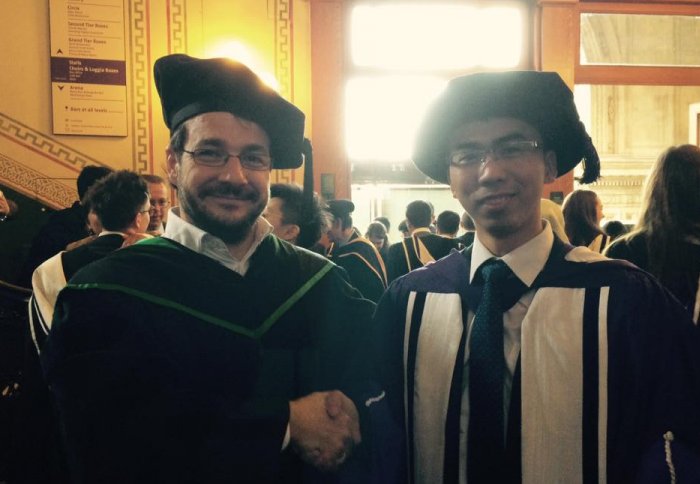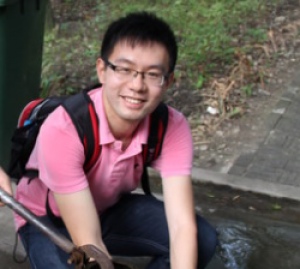Prizewinning PhDs talk about their work

Guillermo Rein and Xinyan Huang
This year, the Department of Mechanical Engineering at Imperial awarded three prizes for PhD work.
The Katopodis Prize for the best thesis submitted in the Thermofluids division went to Xinyan Huang, supervised by Dr Guillermo Rein.
Xinyan’s thesis, “Fundamental Study of Smouldering Combustion of Peat in Wildfires”, aims to provide a better understanding of the fundamental science behind the peat fire phenomena, and to help reduce the global carbon emission from wildland fires. Xinyan’s PhD work also won the Qatar Petroleum Medal for PhD Research Excellence in Clean Fossil Fuels in 2015.
I initially planned to stay in US for my PhD, but [Dr Guillermo Rein] convinced me to move to the UK and become his first PhD student in Imperial.
– Xinyan Huang
Winner of the Katopodis prize for best Thermofluids thesis
Xinyan had initially planned to study for his PhD at the University of California, San Diego, where he received his Master degree, but Dr Guillermo Rein convinced him to come to Imperial: “I was attracted by this fascinating and challenging research topic, peat fire, and more importantly, I was moved by Guillermo’s professional expertise and his passion for science. I really enjoyed working with Guillermo, as he always allowed the right amount of freedom for me to explore my ideas, and provided excellent support when I met with difficulties. He has also been strongly supporting my professional development and guided me become an independent researcher. Our lab (Imperial HazeLab) provides the best learning experience and the best brainstorming environment.”
The Unwin Postgraduate Prize for best PhD thesis in the Mechanical Engineering department had two winners this year. Fan Shi received the prize for his thesis “Stochastic Elastic Wave Scattering from Randomly Rough Surfaces”, supervised by Professor Mike Lowe and Professor Richard Craster (Department of Mathematics).

Fan Shi
Fan explains how he chose the topic for his thesis: “it was strongly motivated by industrial needs, especially for detecting internal rough defects inside critical components, such as those deployed in the nuclear industry. Conventional ultrasonic NDE (non-destructive evaluation) methods and related inspection standards are based on the understanding of wave interaction with defects of smooth surfaces, while all realistic defects/cracks observed are actually rough and the waves scattered from those irregular defects are completely different from the smooth ones.
Fan’s supervisor, Prof Lowe, encouraged him to tackle the problems posed by the topic and assisted him with many valuable discussion. After the completion of his PhD, Fan decided to stay at Imperial as a postdoc in the NDE group. “I think the department offers a very open, cooperative and friendly culture for PhD students”.
Another Unwin Postgraduate Prize for 2017 was awarded to Jianglong Wang, for the thesis “The Solution of Crack Problems based on Bilby-Cottrell-Swinden Model”.
Article text (excluding photos or graphics) © Imperial College London.
Photos and graphics subject to third party copyright used with permission or © Imperial College London.
Reporter
Press Office
Communications and Public Affairs
- Email: press.office@imperial.ac.uk
